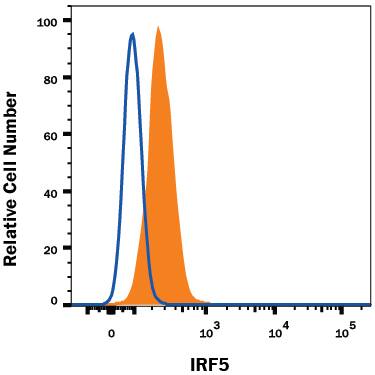IRF5 Products
IRF5 is a member of the IRF family of transcription factors, a family characterized by a helix-turn-helix DNA binding domain enriched in tryptophan repeats. IRF family members show diverse cellular regulation of interferon-stimulated gene transcription, viral-mediated gene activation, apoptosis, differentiation, and cellular growth. IRF5, along with IRF7, are the key mediators of TLR signaling. IRF5 forms heterodimers with IRF3 both of which are necessary for interferon gene transcription. IRF5 knock out mice indicate that IRF5 is critical for induction of apoptosis.
146 results for "IRF5" in Products
146 results for "IRF5" in Products
IRF5 Products
IRF5 is a member of the IRF family of transcription factors, a family characterized by a helix-turn-helix DNA binding domain enriched in tryptophan repeats. IRF family members show diverse cellular regulation of interferon-stimulated gene transcription, viral-mediated gene activation, apoptosis, differentiation, and cellular growth. IRF5, along with IRF7, are the key mediators of TLR signaling. IRF5 forms heterodimers with IRF3 both of which are necessary for interferon gene transcription. IRF5 knock out mice indicate that IRF5 is critical for induction of apoptosis.
| Reactivity: | Human |
| Details: | Sheep IgG Polyclonal |
| Applications: | ICFlow |
| Reactivity: | Human, Mouse |
| Details: | Goat IgG Polyclonal |
| Applications: | WB, ELISA, Flow, ChIP, Mycoplasma |
| Reactivity: | Human |
| Details: | Sheep IgG Polyclonal |
| Applications: | WB, ICC |
| Reactivity: | Human |
| Details: | Sheep IgG Polyclonal |
| Applications: | WB, Simple Western, ICC |
| Reactivity: | Human |
| Details: | Mouse IgG1 kappa Monoclonal Clone #10T1 |
| Applications: | IHC, WB, ELISA, ICC/IF, Flow |
| Reactivity: | Mouse |
| Details: | Rat IgG2b Monoclonal Clone #903430 |
| Applications: | CyTOF-ready, ICFlow |
| Reactivity: | Human |
| Details: | Sheep IgG Polyclonal |
| Applications: | WB, ICC |
Recombinant Monoclonal Antibody.
| Reactivity: | Human, Mouse, Rat |
| Details: | Rabbit IgG Monoclonal Clone #SD203-07 |
| Applications: | IHC, WB, ICC/IF, Flow, IP, +1 More |
| Reactivity: | Mouse |
| Details: | Rat IgG2b Monoclonal Clone #903430 |
| Applications: | ICFlow |
| Reactivity: | Human, Mouse, Rat |
| Details: | Mouse IgG1 Monoclonal Clone #OTI1G7 |
| Applications: | IHC, WB |
| Reactivity: | Human, Mouse, Rat |
| Details: | Mouse IgG1 Monoclonal Clone #OTI1G7 |
| Applications: | IHC, WB |
| Reactivity: | Human, Mouse |
| Details: | Mouse IgG1 kappa Monoclonal Clone #1H6 |
| Applications: | WB, ELISA, ICC/IF, Flow, IP |
| Applications: | ELISA |
| Reactivity: | Mouse |
| Details: | Rat IgG2b Monoclonal Clone #903430 |
| Applications: | ICFlow |
| Reactivity: | Mouse |
| Details: | Rat IgG2b Monoclonal Clone #903430 |
| Applications: | ICFlow |
| Reactivity: | Mouse |
| Details: | Rat IgG2b Monoclonal Clone #903430 |
| Applications: | ICFlow |
| Reactivity: | Human |
| Details: | Sheep IgG Polyclonal |
| Applications: | WB, ICC |
| Reactivity: | Human |
| Details: | Sheep IgG Polyclonal |
| Applications: | ICFlow |
| Reactivity: | Human |
| Details: | Sheep IgG Polyclonal |
| Applications: | WB, ICC |
| Reactivity: | Mouse |
| Details: | Rat IgG2b Monoclonal Clone #903430 |
| Applications: | ICFlow |
| Reactivity: | Mouse |
| Details: | Rat IgG2b Monoclonal Clone #903430 |
| Applications: | ICFlow |
| Reactivity: | Mouse |
| Details: | Rat IgG2b Monoclonal Clone #903430 |
| Applications: | ICFlow |
| Reactivity: | Mouse |
| Details: | Rat IgG2b Monoclonal Clone #903430 |
| Applications: | ICFlow |
| Reactivity: | Human |
| Details: | Sheep IgG Polyclonal |
| Applications: | WB, ICC |
| Reactivity: | Human |
| Details: | Sheep IgG Polyclonal |
| Applications: | WB, ICC |



![Western Blot: IRF5 Antibody [NB100-1092] Western Blot: IRF5 Antibody [NB100-1092]](https://resources.bio-techne.com/images/products/IRF5-Antibody-Western-Blot-NB100-1092-img0004.jpg)

![Western Blot: IRF5 Antibody (10T1)BSA Free [NBP1-04307] Western Blot: IRF5 Antibody (10T1)BSA Free [NBP1-04307]](https://resources.bio-techne.com/images/products/IRF5-Antibody-10T1-Western-Blot-NBP1-04307-img0005.jpg)

![Western Blot: IRF5 Antibody (SD203-07) [NBP2-67742] Western Blot: IRF5 Antibody (SD203-07) [NBP2-67742]](https://resources.bio-techne.com/images/products/IRF5-Antibody-SD203-07-Western-Blot-NBP2-67742-img0004.jpg)

![Western Blot: IRF5 Antibody (OTI1G7)Azide and BSA Free [NBP2-71043] Western Blot: IRF5 Antibody (OTI1G7)Azide and BSA Free [NBP2-71043]](https://resources.bio-techne.com/images/products/IRF5-Antibody-OTI1G7-Azide-and-BSA-Free-Western-Blot-NBP2-71043-img0001.jpg)
![Western Blot: IRF5 Antibody (OTI1G7) [NBP2-45425] Western Blot: IRF5 Antibody (OTI1G7) [NBP2-45425]](https://resources.bio-techne.com/images/products/IRF5-Antibody-1G7-Western-Blot-NBP2-45425-img0007.jpg)
![Western Blot: IRF5 Antibody (1H6) [H00003663-M03] Western Blot: IRF5 Antibody (1H6) [H00003663-M03]](https://resources.bio-techne.com/images/products/IRF5-Antibody-1H6-Western-Blot-H00003663-M03-img0008.jpg)
![ELISA: Human IRF5 ELISA Kit (Colorimetric) [NBP3-39595] Human IRF5 ELISA Kit (Colorimetric)](https://resources.bio-techne.com/images/products/nbp3-39595_human-irf5-elisa-kit-colorimetric-211020241529561.png)


